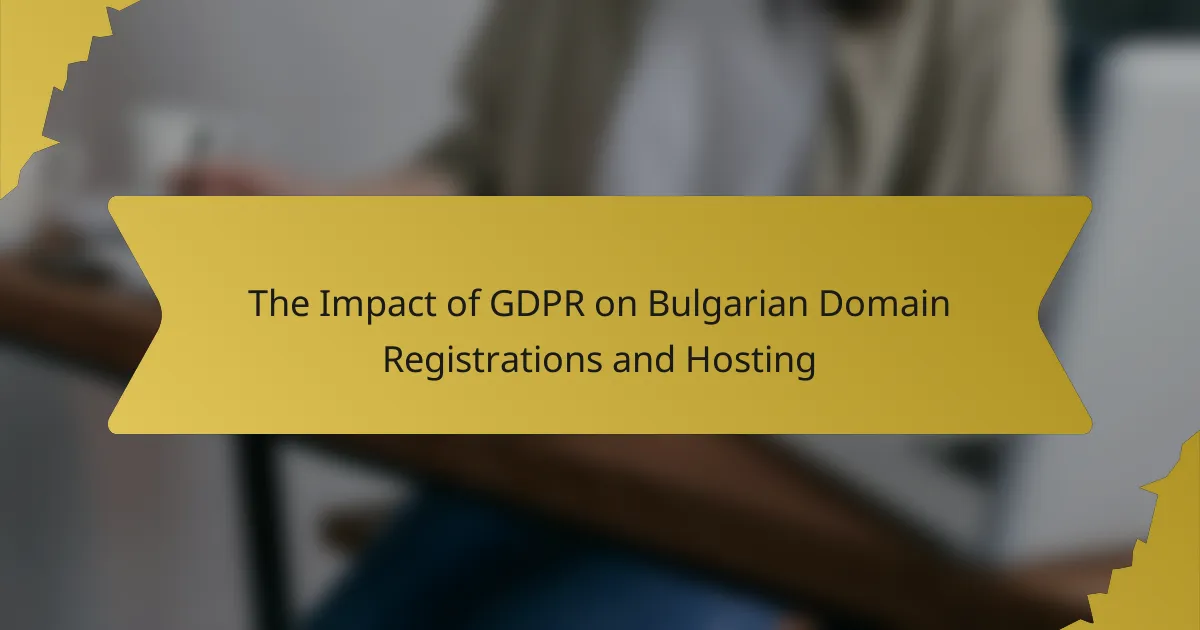The General Data Protection Regulation (GDPR) has profoundly influenced domain registrations and hosting services in Bulgaria, necessitating stricter compliance with data protection standards. Registrars and hosting providers are now required to implement enhanced measures to safeguard personal data, which has led to changes in registration processes and associated costs. Businesses must prioritize GDPR compliance by choosing reliable registrars and establishing robust privacy policies to mitigate risks and ensure proper handling of personal information.
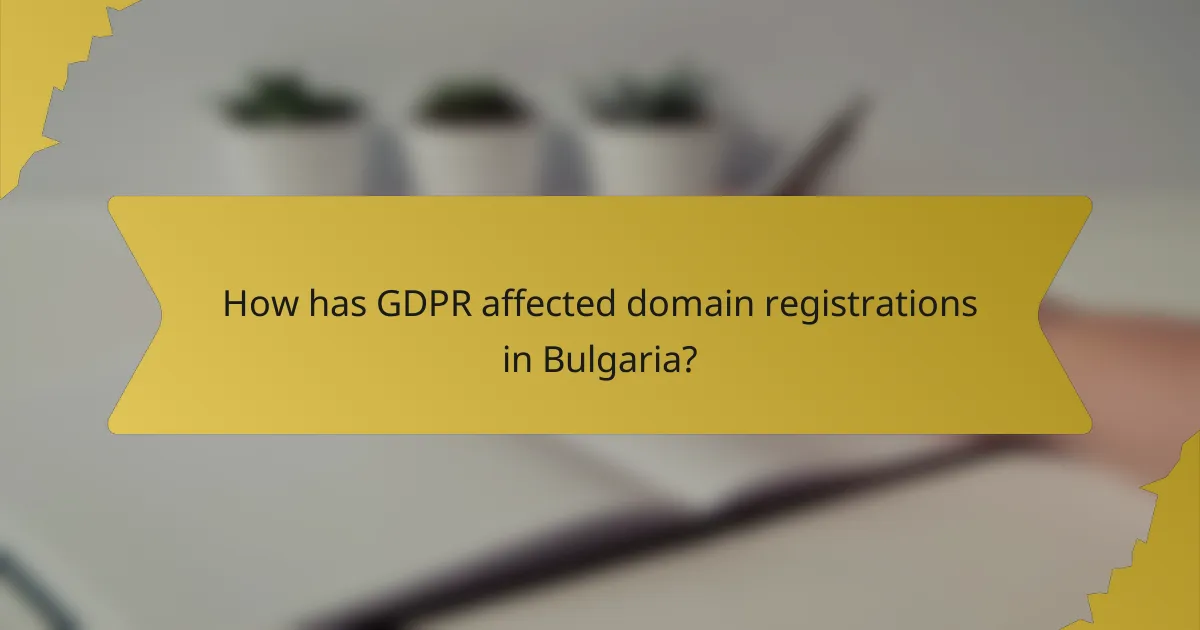
How has GDPR affected domain registrations in Bulgaria?
The General Data Protection Regulation (GDPR) has significantly impacted domain registrations in Bulgaria by imposing stricter compliance requirements and altering how personal data is handled. Registrars must now ensure that they adhere to these regulations, which has led to changes in both processes and costs for domain registration.
Increased compliance requirements
GDPR has introduced heightened compliance requirements for domain registrars in Bulgaria, necessitating a thorough understanding of data protection laws. Registrars must implement measures to protect personal data and ensure that users are informed about their rights regarding data processing.
For example, registrars are now required to provide clear privacy policies and obtain explicit consent from users before processing their personal information. This shift has led to a more transparent registration process, benefiting users by giving them better control over their data.
Impact on registration costs
The implementation of GDPR has influenced registration costs for domains in Bulgaria. Registrars may pass on the expenses associated with compliance, such as legal consultations and system upgrades, to customers, leading to slightly higher registration fees.
While the increase in costs may vary, users should expect potential price hikes of around 10-20% depending on the registrar and the services offered. It’s advisable for users to compare different registrars to find the best value while ensuring compliance with GDPR.
Changes in data handling practices
GDPR has necessitated significant changes in data handling practices among Bulgarian domain registrars. Registrars must now implement robust security measures to protect personal data from breaches and unauthorized access, which includes encryption and regular audits.
Additionally, registrars are required to limit data retention periods and ensure that personal data is only kept as long as necessary for the purpose it was collected. This shift not only enhances user privacy but also fosters trust in the domain registration process.
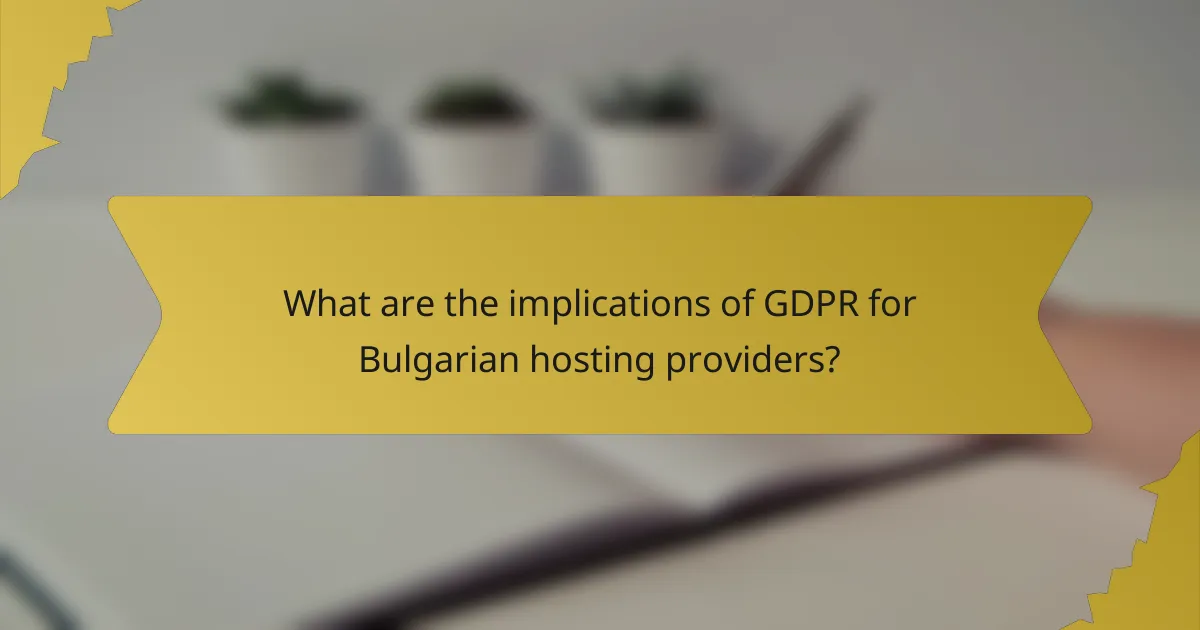
What are the implications of GDPR for Bulgarian hosting providers?
The General Data Protection Regulation (GDPR) significantly impacts Bulgarian hosting providers by enforcing stricter data protection and privacy standards. These regulations require providers to implement robust measures to safeguard personal data and ensure compliance with the law to avoid penalties.
Enhanced data protection measures
Bulgarian hosting providers must adopt enhanced data protection measures to comply with GDPR. This includes implementing encryption, access controls, and regular security audits to protect customer data from unauthorized access. Providers should also ensure that data processing agreements are in place with third-party vendors to maintain compliance throughout the data handling process.
Additionally, hosting companies are encouraged to conduct Data Protection Impact Assessments (DPIAs) to identify and mitigate risks associated with data processing activities. By proactively addressing potential vulnerabilities, providers can better protect their clients’ data and maintain trust.
Liability for data breaches
Under GDPR, Bulgarian hosting providers face increased liability for data breaches, which can result in significant fines and reputational damage. If a breach occurs, providers are required to notify affected individuals and the relevant authorities within a specific timeframe, typically within 72 hours. Failure to comply can lead to penalties amounting to millions of BGN.
To mitigate liability, hosting providers should establish clear incident response plans and conduct regular training for their staff. This ensures that all employees understand their roles in maintaining data security and are prepared to act swiftly in the event of a breach.
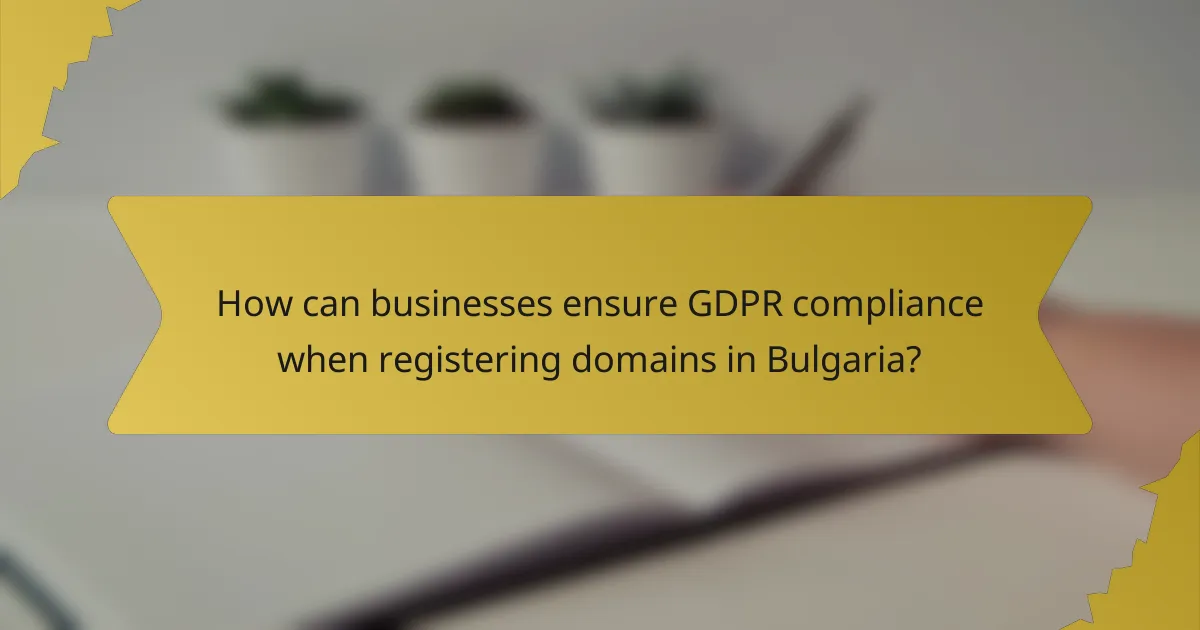
How can businesses ensure GDPR compliance when registering domains in Bulgaria?
Businesses can ensure GDPR compliance when registering domains in Bulgaria by selecting registrars that adhere to data protection regulations and implementing robust privacy policies. This approach minimizes the risk of data breaches and ensures that personal data is handled appropriately.
Utilizing GDPR-compliant registrars
Choosing a GDPR-compliant registrar is crucial for businesses operating in Bulgaria. These registrars must demonstrate adherence to the General Data Protection Regulation by implementing necessary security measures and providing clear data handling policies.
Look for registrars that offer features like WHOIS privacy protection, which masks personal information from public databases. This can help mitigate risks associated with data exposure and enhance overall compliance with GDPR standards.
Implementing privacy policies
Establishing clear privacy policies is essential for businesses to comply with GDPR when registering domains. These policies should outline how personal data is collected, used, stored, and shared, ensuring transparency for users.
Regularly review and update your privacy policies to reflect any changes in data handling practices or regulations. Additionally, consider training staff on GDPR requirements to ensure everyone understands their role in maintaining compliance.

What challenges do Bulgarian businesses face under GDPR?
Bulgarian businesses encounter several challenges under GDPR, primarily related to compliance, data management, and financial implications. Navigating these regulations requires a clear understanding of data protection principles and the associated costs of adhering to them.
Understanding complex regulations
The GDPR introduces intricate regulations that mandate how businesses handle personal data. Bulgarian companies must familiarize themselves with concepts such as data subject rights, consent requirements, and the necessity of appointing a Data Protection Officer (DPO) in certain cases.
Moreover, the regulations often require businesses to implement specific technical and organizational measures to ensure data security. This can include encryption, regular audits, and maintaining detailed records of data processing activities.
Costs of compliance
Compliance with GDPR can impose significant costs on Bulgarian businesses, particularly for small and medium-sized enterprises (SMEs). Expenses may arise from hiring legal experts, investing in data protection technologies, and conducting employee training sessions.
Estimates suggest that compliance costs can range from a few thousand BGN for smaller businesses to tens of thousands for larger organizations, depending on the complexity of their operations and the volume of personal data they process. Companies should budget for ongoing compliance efforts, as GDPR requirements may evolve over time.
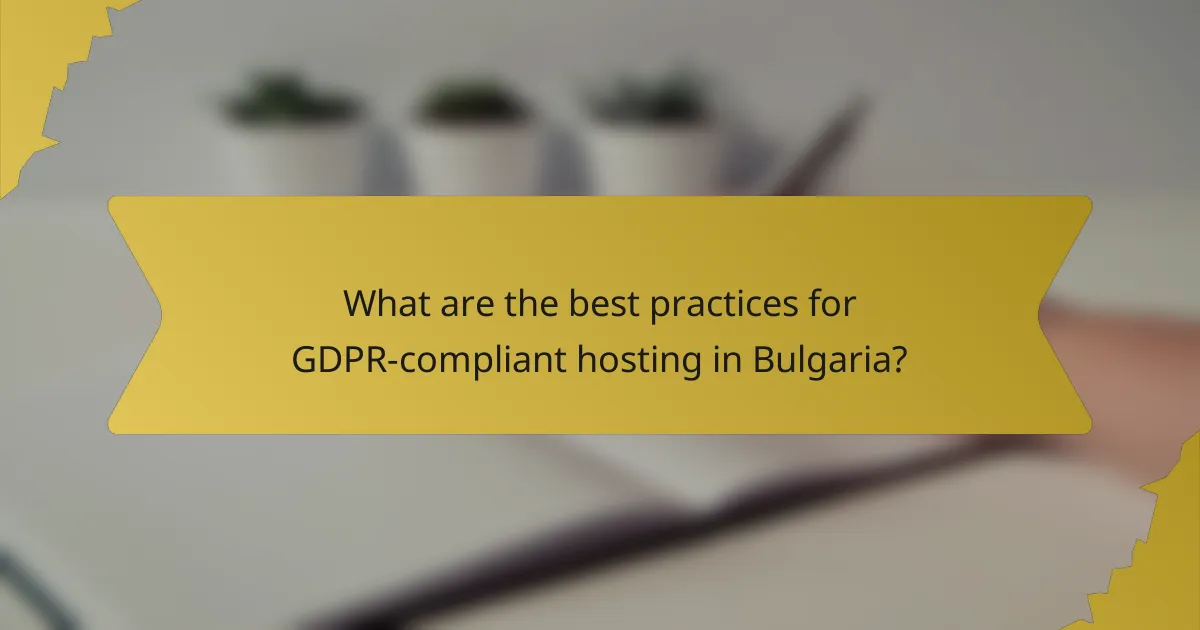
What are the best practices for GDPR-compliant hosting in Bulgaria?
To ensure GDPR-compliant hosting in Bulgaria, organizations should prioritize data protection by implementing robust security measures, utilizing local data centers, and conducting regular audits. These practices help safeguard personal data and maintain compliance with EU regulations.
Choosing local data centers
Selecting local data centers in Bulgaria is crucial for GDPR compliance, as it allows organizations to keep personal data within the EU. This minimizes the risk associated with cross-border data transfers and ensures adherence to local data protection laws.
When choosing a data center, consider factors such as physical security, uptime guarantees, and compliance certifications. Look for facilities that are ISO 27001 certified or have similar standards, as these indicate a commitment to data security and privacy.
Regular audits and assessments
Conducting regular audits and assessments is essential for maintaining GDPR compliance in hosting environments. These evaluations help identify potential vulnerabilities and ensure that data protection measures are effective and up to date.
Establish a routine schedule for audits, ideally every six months, to review data handling practices, security protocols, and compliance with GDPR requirements. Utilize third-party auditors when necessary to provide an objective assessment and enhance credibility.
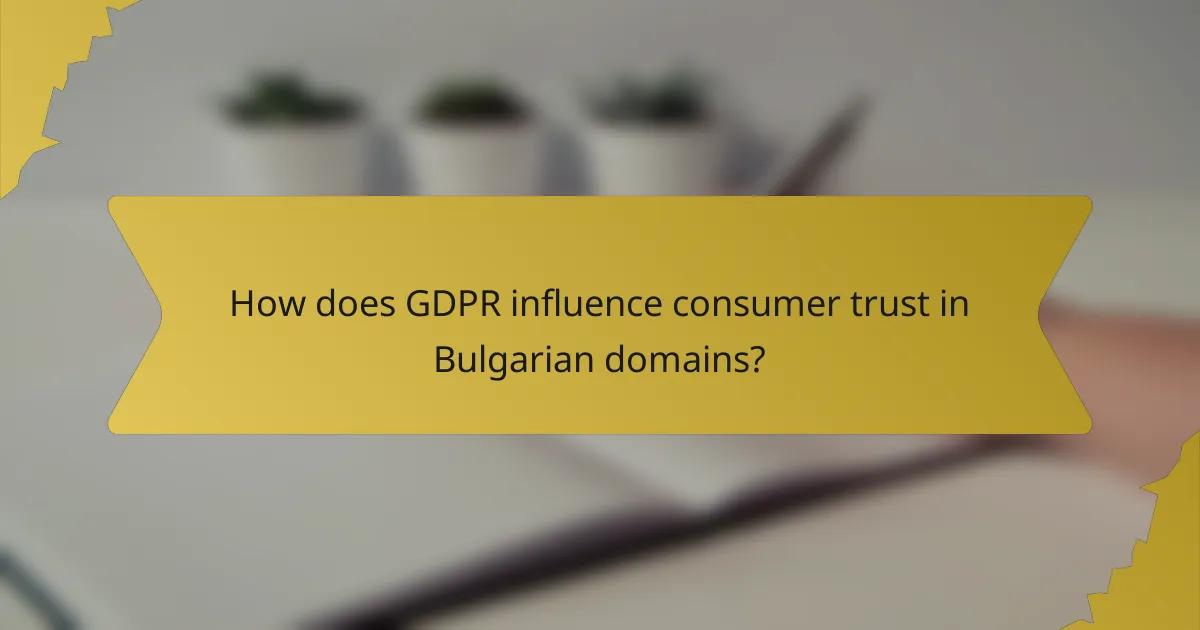
How does GDPR influence consumer trust in Bulgarian domains?
The General Data Protection Regulation (GDPR) significantly enhances consumer trust in Bulgarian domains by ensuring stricter data protection and privacy measures. This regulation mandates that businesses handle personal data transparently and responsibly, which reassures consumers about their online security.
Increased consumer confidence
GDPR fosters increased consumer confidence in Bulgarian domains by providing clear rights regarding personal data. Consumers are more likely to engage with websites that demonstrate compliance with GDPR, knowing they have control over their information.
For instance, when registering a domain in Bulgaria, users can expect that their data will be processed lawfully, which can lead to a higher willingness to share personal information. This trust can translate into increased website traffic and customer loyalty.
Transparency in data usage
Transparency in data usage is a core principle of GDPR, requiring Bulgarian domain registrars to clearly inform consumers about how their data will be utilized. This includes details on data collection, processing, and storage practices.
For example, registrars must provide privacy policies that are easy to understand, outlining the purposes of data collection and the rights of consumers. This level of transparency not only builds trust but also encourages responsible data practices among businesses operating in Bulgaria.
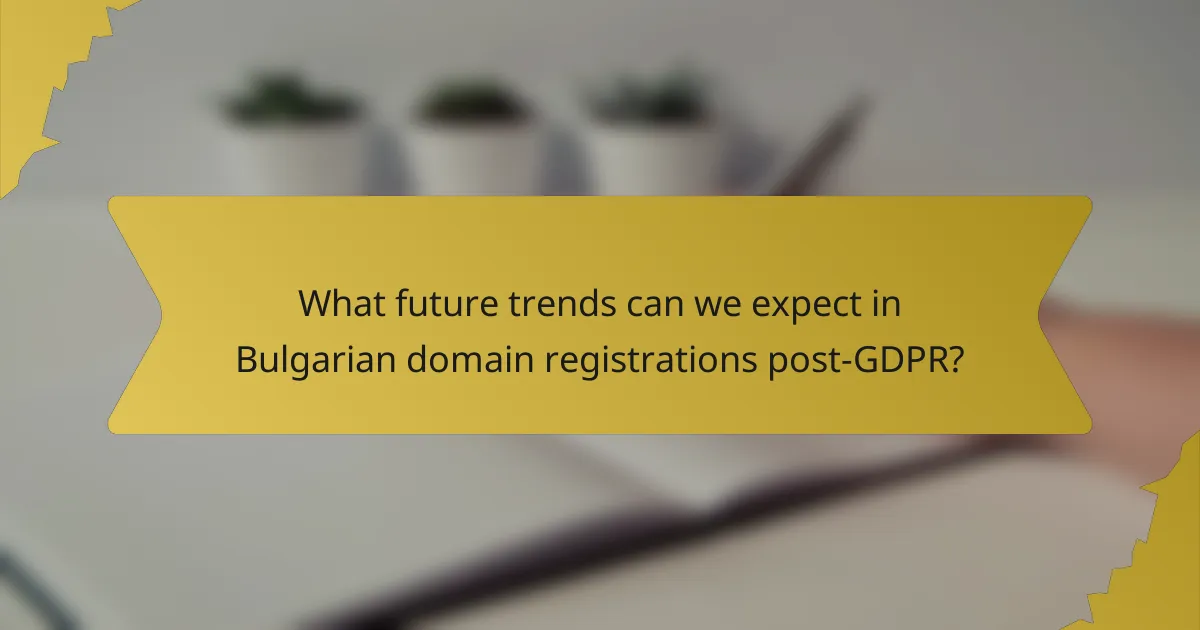
What future trends can we expect in Bulgarian domain registrations post-GDPR?
Post-GDPR, Bulgarian domain registrations are likely to see a significant shift towards enhanced privacy and compliance measures. This will influence both the types of services offered and the tools available to domain owners and registrars.
Growth of privacy-focused services
The demand for privacy-focused services is expected to rise as individuals and businesses seek to protect their personal data. Registrars may offer enhanced privacy features, such as WHOIS privacy protection, which conceals registrant information from public databases.
Additionally, services that facilitate anonymous domain registrations will likely gain traction. This trend aligns with the broader European emphasis on data protection and privacy rights, making it essential for registrars to adapt to these consumer preferences.
Emergence of new compliance tools
As GDPR regulations continue to evolve, new compliance tools will emerge to help domain registrars and owners navigate these requirements. These tools may include automated systems for managing consent and data requests, ensuring adherence to privacy laws.
Furthermore, educational resources and platforms will likely become available to assist businesses in understanding their obligations under GDPR, making compliance more manageable and less daunting.
Shift towards decentralized hosting solutions
The shift towards decentralized hosting solutions is anticipated as users seek greater control over their data. Decentralized platforms can offer enhanced security and privacy by distributing data across multiple nodes, reducing the risk of data breaches.
This trend may encourage Bulgarian businesses to explore blockchain-based hosting options, which can provide transparency and accountability in data management. As awareness of these solutions grows, more companies may consider them as viable alternatives to traditional hosting services.
